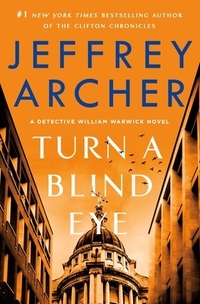Turn a Blind Eye by Jeffrey Archer
 Monday, April 12, 2021 at 7:15AM
Monday, April 12, 2021 at 7:15AM 
Published by St. Martin's Press on April 13, 2021
William Warwick enters Turn a Blind Eye as a Detective Sergeant and leaves as a Detective Chief Inspector. That is the pattern in the Warwick novels. The young man starts from the bottom, completes an investigation with an arrest and a conviction (aided by his father, who prosecutes), and earns a promotion. His meteoric rise must be the envy of the Metropolitan Police.
The Warwick series divides William’s story into multiple novels — three so far. After a brief stint as a beat cop, Warwick put his art history education to use in the first book, where he met his nemesis, the wealthy Miles Faulkner. In the second book, Warwick moves to drug investigations, where he again encounters Faulkner, who has expanded his criminal repertoire from art forgery to drug distribution. In this third novel, Warwick moves into a new unit, the Met’s version of internal affairs, where he investigates corrupt cops.
Faulker dies and is cremated at an early point in the story, although nobody believes he’s really dead, least of all the reader. By the novel’s end, Warwick is again promoted and transferred to the murder squad. Faulkner is still at large and engaged in more scheming with his art collection. Warwick’s wife and Faulkner’s former wife continue to pursue their unlikely friendship.
The primary plot involves a bent copper named J.R. Summers, who investigates burglaries and helps himself to part of the loot. He’s particularly successful at busting members of a London crime family while spectacularly unsuccessful at gathering evidence against a rival crime family. That discrepancy leads to the obvious suspicion that Summers is corrupt. Summers becomes involved with a detective constable who apparently doesn’t understand the concept of birth control, leading Warwick and his cohorts to hope that she will merely experience heartbreak as a girlfriend rather than a conviction as a co-conspirator.
A second plot thread involves Assem Rashidi, another drug dealer. Warwick must testify against Rashidi, resulting from Warwick’s earlier stint in the drug unit. As always, the Crown is represented by Warwick’s father, Sir Julian, who is second chaired by Warwick’s sister. Why anyone thinks that a father questioning his son is a good idea is beyond me, given the likelihood that the defense will be pointing out the conflict of interest to the jury at every opportunity. The defense barrister, Booth Watson, instead focuses on a variety of dirty tricks. The Warwicks go up against Watson again in the novel’s second trial, this one involving Summers.
The trials are the best part of Turn a Blind Eye. None of the barristers are as clever as Rumpole, but courtroom clashes are always fun. Both sides get away with questioning that would never be allowed in an American courtroom, but perhaps British judges are more tolerant of unfair tactics.
As always, Warwick — whose commitment to rectitude has earned him the name “choirboy” — is a one-dimensional character, and that dimension is dull. As proof that Warwick has a personality, Jeffery Archer has Warwick and his father reciting historical facts and quoting great works of literature. To be a Warwick is to be admired by other Warwicks. I suppose being pompous and self-satisfied is indeed a personality, but it is not one anyone would admire other than similarly pompous and self-satisfied members of the British aristocracy. How Warwick managed to conceive his twins is a mystery, since he has no discernable interest in anything as messy as sex. He likely thought it was his duty to procreate. Warwick is all about duty.
None of these novels suggest that there is any gray area between good and evil. Good people are resolutely good and only a scallywag like Watson would defend the guilty. Readers who don’t want to grapple with the complex reality of life will probably find this series refreshing. The stories are certainly pleasant and the courtroom scenes, at least, are entertaining. Others might find the Warwick novels to be a bit one dimensional, if not dull. The novel’s ending isn’t exactly a cliffhanger, but it does set up another confrontation between Warwick and Faulkner.
RECOMMENDED
Reader Comments